“I saw a werewolf with a Chinese menu in his hand.” So begins ‘Werewolves of London.’
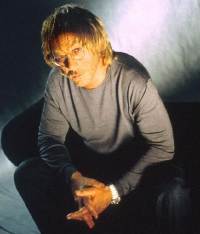 Everybody knows the song; it’s featured on plenty of film soundtracks and is pulled out every Halloween, as perennial a favorite as ‘Monster Mash.’
Everybody knows the song; it’s featured on plenty of film soundtracks and is pulled out every Halloween, as perennial a favorite as ‘Monster Mash.’
The song took Warren Zevon into the top ten with its quirky lyric and sing-along chorus. Unfortunately, to the public, it was perceived as a novelty item, and barely hinted at the songwriting genius behind it.
It wasn’t the first time he was misunderstood.
Initially lumped into the Southern California singer-songwriter scene, he never really fit the peaceful easy feeling/back-to-Woodstock vibe that Asylum label mates Joni Mitchell and the Eagles embodied. Songs like ‘Lawyers, Guns, and Money,’ ‘Splendid Isolation,’ and ‘Excitable Boy’ managed to bridge the gap between folk and punk rock.
In spite of a lifetime of addictive behavior, Zevon was one of the greatest writers of his generation. This fact was too often overlooked, due to his larger than life – and life threatening – exploits.
He was born in 1947 to a Mormon mother and a professional gambler father – who had ties to the Russian/Jewish Mafia. His parent’s union – not surprisingly – was short-lived and tumultuous.
When he was nine years old, his father dropped by with his Christmas gift: a piano he had won in a poker game. Mother was furious, and Dad responded by tossing a carving knife at her; she took off out the door, and the piano stayed.
The two then sat down for their first ever father-and-son talk; “Son, you know I gotta go…But there’s something you better know. Your mother and your grandmother have been telling you you’re the Pope in Rome, right? Well, you ain’t never going to be no Pope, you know why? Because you’re a Jew. You hear me, son? You’re a Jew. Don’t ever forget that.”
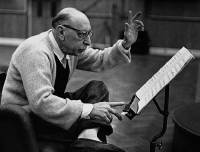
He took to the piano immediately, and by junior high was showing enough potential to warrant an introduction to Russian classical music legend Igor Stravinsky, who was living in Los Angeles at the time. He quickly became a regular visitor to the maestro’s home, where they would listen to recordings and study scores together. Stravinsky encouraged him to pursue a career in conducting, and the future looked set until Zevon’s family moved from the area, and the friendship ended. He would later compose string arrangements on his own records, but for the most part work would be confined to the pop realm. Years later he wrote that the experience with Stravinsky was one of his “most treasured and inspirational memories.”
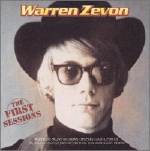 In 1966 he made his recording debut, as half of a folk-rock duo named Lyme & Cybelle. He was Lyme, and accordingly, dressed head-to-toe in green. He wrote most of their material, including ‘Follow Me,’ a proto raga-rock number which received airplay in Southern California. The Turtles – like the duo – were signed to White Whale records, and released Zevon’s ‘Outside Chance’ as a single the same year.
In 1966 he made his recording debut, as half of a folk-rock duo named Lyme & Cybelle. He was Lyme, and accordingly, dressed head-to-toe in green. He wrote most of their material, including ‘Follow Me,’ a proto raga-rock number which received airplay in Southern California. The Turtles – like the duo – were signed to White Whale records, and released Zevon’s ‘Outside Chance’ as a single the same year.
I spoke with Mark Volman, who along with partner Howard Kaylan has led the Turtles since the beginning: “We were already tapped into Warren’s music as a friend when he played us ‘Outside Chance.’ That was presented to Howard and I one night, friend-to-friend.”
The next year they recorded another Zevon composition; ‘Like the Seasons.’
“We had become mutual fans of each other’s music. We weren’t really looking to Warren to write for the Turtles, because it didn’t really seem to fit. But…when they brought us the song, we couldn’t really turn it down; it’s just such a great song. We weren’t picking songs to record because it was a White Whale artist or anything; it was just a really great song.”
The band placed ‘Like the Seasons’ on the ‘B’ side of ‘Happy Together,’ which became a worldwide #1 hit, securing Zevon’s credibility as a writer, and far more money than he had ever seen. Much of it went to fuel a growing drug and alcohol habit.
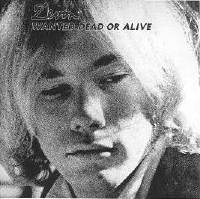 Lyme & Cybelle folded soon after, and he recorded an instantly obscure solo album in 1969 that did little to showcase his talent.
Lyme & Cybelle folded soon after, and he recorded an instantly obscure solo album in 1969 that did little to showcase his talent.
That same year he became a father for the first time. When his girlfriend went into labor, he dropped her at the hospital, and headed off to the studio for a session, missing his son’s birth. His relationship with the boy’s mother ended soon after, and any sort of contact with his son was negligible for the next decade.
Meanwhile, he continued recording demos, and took a job as music director for the Everly Brothers band.
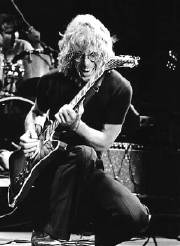 Over the next few years, the partying – which had already caused problems – escalated. Without any real success in the music industry, and in an attempt to get his drinking under control, he moved to Spain with his new wife, Crystal, in 1975.
Over the next few years, the partying – which had already caused problems – escalated. Without any real success in the music industry, and in an attempt to get his drinking under control, he moved to Spain with his new wife, Crystal, in 1975.
He later referred to their time abroad as one of the happiest periods of his life. After a few months, Jackson Browne wired, promising he could secure a recording deal if they would return to California.
They came home.
Things were looking up career wise, but personal issues were getting out of hand. In I’ll Sleep When I’m Dead Crystal recounts how on the night the deal with Asylum was signed, their daughter was conceived during a tender lovemaking session, after which Warren became enraged, and hit her for the first time. The police were summoned, and – overcome with remorse – Warren broke into tears, pleading for another chance. She agreed to drop the charges, but moved out of their home, only to return a few days later. It wouldn’t be the last time this scenario played out.
 While Crystal was in labor, Warren visited the hospital chapel and promised God that if mother and child came through okay, he would stop drinking vodka for a month. She delivered a healthy baby girl, and – true to his word – he kept his promise; employing classic alcoholic logic, he switched to bourbon the very next day.
While Crystal was in labor, Warren visited the hospital chapel and promised God that if mother and child came through okay, he would stop drinking vodka for a month. She delivered a healthy baby girl, and – true to his word – he kept his promise; employing classic alcoholic logic, he switched to bourbon the very next day.
Despite repeated attempts at sobriety, the marriage ended, with Zevon in worse shape than ever. Drinking himself into oblivion, his lost weekend lasted close to a decade. Former guitarist David Landau witnessed the behavior first hand; “The only thing I ever saw that came close to how Warren drank was Nicolas Cage in Leaving Las Vegas.”
By the mid-eighties, the self destructive exploits had taken their toll. In less than a decade he’d gone from critically-lauded up-and-comer to pariah. He’d burned almost every bridge, and – without a record deal, freebasing, and experiencing seizures – he finally hit rock bottom.
 In 1986 he got sober for real, and stayed that way for the next seventeen years. Attending up to three A.A. meetings a day, and working the 12 Steps religiously, he wrote in his journal that he was at last; “in Higher Power’s hands.”
In 1986 he got sober for real, and stayed that way for the next seventeen years. Attending up to three A.A. meetings a day, and working the 12 Steps religiously, he wrote in his journal that he was at last; “in Higher Power’s hands.”
Ironically, after years of dealing with Warren’s drinking, Crystal came to realize that she too, was an alcoholic. She eventually sobered up, and credits him as one of her strongest supporters in her journey to sobriety.
Three years after joining A.A., he discovered his sponsor had fallen off the wagon. He took it hard. Feeling betrayed, he never again set foot in a meeting.
He managed to stay sober, but things quickly got out of hand in other areas. The alcohol and drugs had disguised an Obsessive Compulsive Disorder, and without the input of others, it got ugly. As one ex-girl friend put it; “our little bad boy became a real bad boy.” Drink and drugs were replaced by a number of bizarre behaviors, including a sexual addiction.
He would have ‘good luck’ and ‘bad luck’ days; if he heard the wrong (unlucky) word, it could color everything. One Christmas Eve, each and every gift he received was systematically destroyed, rather than risk any negative effect.
He would go through upwards of ten coke bottles before finding a suitable drink; it had to emit the right sound when the cap was opened.
There were rituals, such as wearing the same brand of grey t-shirt. He owned hundreds, many never removed from their packaging. At his funeral friends were presented with brand new gray t-shirts from his extensive collection.
Despite the bizarre behavior, author and longtime friend Stephen King – a recovering alcoholic himself – had nothing but respect for Zevon; “I never saw him take a drink. I never saw him take a cigarette…I have no idea to this day how Warren dealt with not drinking. All I know is that he didn’t drink. That, to me, is really the story of Warren Zevon.”
Zevon originally made his reputation as a writer, with the Turtles, Jackie DeShannon and Linda Ronstadt – who covered four songs from his debut album for Asylum – being among the first to recognize his talent. Over the years a wide assortment of artists have dipped into his songbook, including Hank Williams, Jr, Buddy Rich, Bob Dylan, Meatloaf, Dexys Midnight Runners, The Pretenders, Terri Clark, and the Grateful Dead.
While other singer-songwriters were sharing emotional paeans of love and hope for a better world, he wrote about Headless Thomson Gunners and Excitable Boys who rubbed pot roast all over their chests before raping and murdering their prom dates.
Some labeled him as hardened, but he saw himself “as being very sincere. Warm-hearted and sincere. I don’t think I’m cynical: the characters in my songs always endear themselves to me in the process of writing about them.”
The foibles of the human heart were frequent themes. Exploring the dark side of the human psyche, he rarely identified who was right or wrong, explaining, “in its best form that kind of ambivalence has the quality of making you sympathetic to both sides.”
He took inspiration from authors like Raymond Chandler, Ross McDonald and John Updike.

Respect from the literary community was reciprocal. Stephen King, Carl Hiaasen, Jonathan Kellerman, Eve Babitz, Thomas McGuane, Paul Muldoon, Ridley Pearson, Hunter Thompson, Gore Vidal, Dave Barry, Mitch Albom, and Faye Kellerman – to name twelve – all counted themselves as fans and friends.
Zevon first met many of them by attending book signings, lining up alongside the rest of the admirers for autographs. Invariably the writers were well aware of his work, and thrilled to learn he was a fan of theirs.
He also loved film. From his journal in 2000: “Kieslowski’s Decalogues coming out on DVD! Happiness finally restored.” Not that he was an elitist; one tour manager marveled at his insistence on watching Miss Congeniality repeatedly while traveling.
He was drawn to matters of faith his entire life. He liked to quote Graham Greene, who described his own Christian belief as “a troubled, paradoxical faith.” But, as Zevon pointed out; “Greene also said; I don’t believe. But the trouble is I don’t believe my unbelief.”
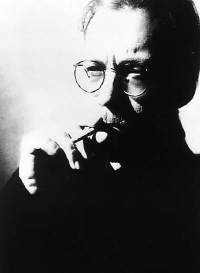 Mark Volman knew him near the beginning, when all that mattered was getting a hit record.
Mark Volman knew him near the beginning, when all that mattered was getting a hit record.
“I never really thought of Warren ever as being anybody who ever did anything except make fun of the spiritual. He had more of a tongue-in-cheek outlook on it all. I’m sure once he was told he was dying, he was – you know – everybody gets spiritual. In the relationship I had with him he was a ‘casual Christian.’” Volman laughs. “I never got a sense that he had any beliefs at all; he had a cocky attitude about life. I think, in his youth, he felt like he would outlive everything.”
In fact, the change came decades before the end. As early as 1975, when they moved to Spain, Crystal recalls his attempts to convert to Catholicism.
“He decided we should convert. He meant it…he bought me a little gold cross to wear around my neck…I wasn’t too enamored of the Catholic part, but I did love the reverence it brought up in him.”
Two decades later he was still attracted to Catholicism – reading books on the subject, attending Mass and even identifying himself as a Catholic.
When his voice was giving him trouble during a tour in 2000, he wrote in his journal: “Something told me to find a church. I walked right in on a mass in progress…The show was good: I know why. Peace be with you.”
He didn’t stick with just one denomination. Hunter S. Thompson – who referred to Warren as his ‘fellow failed Jesuit’ – once proclaimed; “You’re a Mormon Jew” Zevon’s response; ‘How did you know?’
The songs reflected his spiritual journey. In the mid-nineties, he commented: “I’m all cussed out…I can’t really go any farther in that direction, so it may be more disturbing for people to find me singing gentler songs and sentiments, and even Christian and Buddhist ones.”
He had a life-long phobia of doctors. After prolonged breathing problems, in 2002 he relented, and agreed to see a physician. It was his first visit in twenty years. He was diagnosed with inoperable mesothelioma, a form of lung cancer, and given three month to live.
His record label set up a meeting with New Age guru Deepak Chopra. Zevon was less than impressed. Deepak gave him some books (“He didn’t even sign them”) and left him with a choice; to “spend every cent I have going to Deepak’s ashram, or leave a college fund for my grandchildren.”
Describing Warren as his “cherished friend,” Mitch Albom, author of Tuesdays With Morrie met with him two days after the diagnosis. They discussed how to approach his impending demise. After mulling over his options, he decided to “make as much music as I can possibly make before I go.” He told his ex-wife; “My job is music. It’s all I can leave the kids and people I love, so I’m going to stay in L.A. to make a record.”
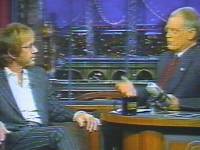 He instructed his manager to go into “showbiz mode;” giving her permission “to use my illness in any way that you see fit to further my career right now.” His label head comments that “beyond the strength and the courage, which is undeniable, there was this incredible, intuitive savvy of marketing…He’d been in the business for his entire life, and he hit it right on the head…when it all came down, he knew what he was doing more than anybody at any of these labels did.”
He instructed his manager to go into “showbiz mode;” giving her permission “to use my illness in any way that you see fit to further my career right now.” His label head comments that “beyond the strength and the courage, which is undeniable, there was this incredible, intuitive savvy of marketing…He’d been in the business for his entire life, and he hit it right on the head…when it all came down, he knew what he was doing more than anybody at any of these labels did.”
For a brief period he returned to drinking. Friends were distraught, worried he was trying to beat death by dieing at his own hand rather than wait for the cancer to do it’s work. He soon straightened out, and got to work on the album.
On learning of the diagnosis, David Letterman – a long time friend and fan – devoted an entire show to Zevon. Just the two of them, it was brutal, dignified and heart wrenching television; far more authentic than any fabricated reality show could ever hope to be. There was no attempt to pretend the disease could be beat. Warren acknowledged his condition was likely the result of choices he had made in the past, succinctly stating; “…you make choices and then you have to live with the consequences. There are always consequences.” Queried if he had learned anything in facing death, Zevon told Letterman; “Not unless I know how much you’re supposed to enjoy every sandwich.”
The diagnosis did bring about a change. Actor Billy Bob Thornton noticed “a softer, gentler side. He said sometimes underneath all the sarcastic things he was saying about death, he felt frightened – like he just didn’t know what was happening to him.”
When Bruce Springsteen – who once called him “a moralist in cynic’s clothing” – arrived to play guitar on the album, he detected a new outlook; “very, very open in a way that I don’t recall having seen before. Very, very open and generous and filled with life at that particular moment.” He told Springsteen: “It’s a sin not to try to stay alive.”
The Wind is informed throughout by his impending demise. ‘Prison Grove’ includes a plaintive request to ‘Shine on all these broken lives/Shine on/Shine the light on me.’ The album’s final track, ‘Keep Me in Your Heart’ was recorded after Zevon became too sick to travel to the studio. Instead, he sang it from home. The lyric is a fitting finale; “Shadows are falling and I’m running out of breath/Keep me in your heart for awhile.’


He hung on for well over a year – far longer than expected. He had reconciled with both of his children years earlier, and on learning his daughter had become pregnant with twins, became determined to be there for their birth. Despite his worsening condition, he insisted on visiting the hospital when she delivered. After meeting his grandsons, he told Crystal, “Come on. I know where the chapel is in this joint. Let’s go thank the Big Guy in the Sky.”
They weren’t empty words. Ryan Rayston helped nurse him right to the end, and commented that no matter how bad things got; “His belief in God was unwavering.”
He died in September 2003, a week after the release of The Wind, which had the strongest first week sales of his career. The album was nominated for five Grammy awards – his first ever – and won two.
Death was good for his career. As he mused shortly before passing, “It’s a damned hard way to make a living, having to die to get ‘em to know you’re alive.”
 A week before he died Warren asked Crystal – the two had remained close in spite of their divorce – to write his story, warts and all; “tell ‘em the whole truth, even the awful, ugly parts.”
A week before he died Warren asked Crystal – the two had remained close in spite of their divorce – to write his story, warts and all; “tell ‘em the whole truth, even the awful, ugly parts.”
The result; I’ll Sleep When I’m Dead, is a moving, at times difficult read, told in his own words and by those who knew him best. She interviewed over eighty friends, lovers, and acquaintances who shared his life. Through it all, we have Zevon’s own journal corroborating. He recorded his own take with brutally honesty. At times, the picture painted is shocking; an alcoholic/addict with Obsessive Compulsive Disorder, selfish almost beyond belief.
Thankfully, it’s not an angry book. Instead it’s filled with love, humor, and compassion. Redemption comes slowly – very slowly – in minute increments. Like every one of us, Zevon was a work in progress, and in spite of his darkest moments, he was truly loved, and loved back the best he could. Given the hand he was dealt, it’s remarkable how much good he brought to the world.
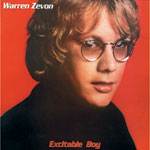 In addition to I’ll Sleep When I’m Dead, the past few months have brought four new CD releases.
In addition to I’ll Sleep When I’m Dead, the past few months have brought four new CD releases.
 Rhino has issued expanded versions of three of Zevon’s earlier albums, two on CD for the first time.
Rhino has issued expanded versions of three of Zevon’s earlier albums, two on CD for the first time.
1978’s Excitable Boy made the top ten thanks to the inclusion of ‘Werewolves of
London’ – which went top 40 itself. He built his reputation on the first two Asylum discs, and this – the second – includes some of his most endearing compositions, including the title track, ‘Lawyers, Guns and Money,’ ‘Roland, the Headless Thompson Gunner,’ and ‘Johnny Strikes Up the Band.’
Stand In the Fire is a live album recorded two years later, soon after his first attempt at getting straight. It’s one of the great live albums of the era. There’s a razor-sharp focus due to his newfound sobriety, and the absence of studio pros ensures a rougher, almost incendiary conviction from his touring band.
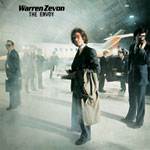 The Envoy followed in 1982, and was the first album to feature material written while he was straight. ‘Ain’t that Pretty at All,’ with it’s telling line; “I’d rather feel bad than not feel anything at all” is indicative of the change in attitude. ‘Jesus Mentioned’ deals with mortality, specifically, the death of Elvis Presley, who went ‘walking on the water with his pills.’ The album was every bit the equal of what came before, but failed to connect sales wise. He was subsequently dropped by the label and relapsed back to drinking. It would be another five years before he would get straight and release his next record.
The Envoy followed in 1982, and was the first album to feature material written while he was straight. ‘Ain’t that Pretty at All,’ with it’s telling line; “I’d rather feel bad than not feel anything at all” is indicative of the change in attitude. ‘Jesus Mentioned’ deals with mortality, specifically, the death of Elvis Presley, who went ‘walking on the water with his pills.’ The album was every bit the equal of what came before, but failed to connect sales wise. He was subsequently dropped by the label and relapsed back to drinking. It would be another five years before he would get straight and release his next record.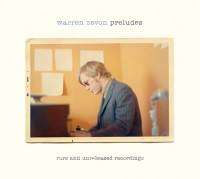
Preludes: Rare and Unreleased Recordings (New West) offers 17 unreleased recordings made prior to 1976, including six songs that have never appeared on an album in any form. Some are just Warren and piano, and it’s a pleasure to hear him without the usual studio sheen. In many cases these stripped down performances are every bit as enjoyable as the more well-known versions.
© John Cody 2007